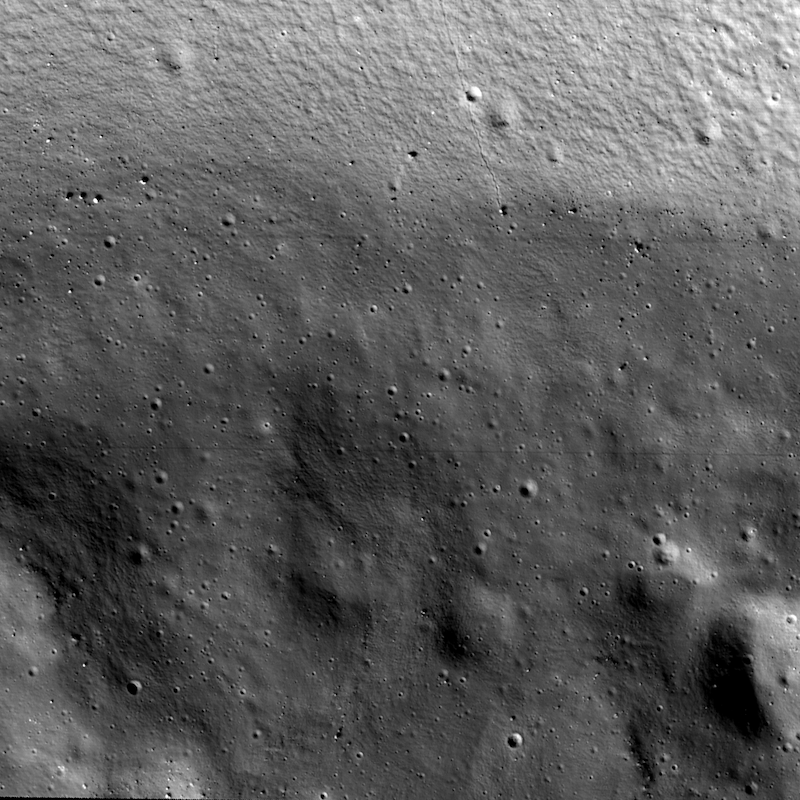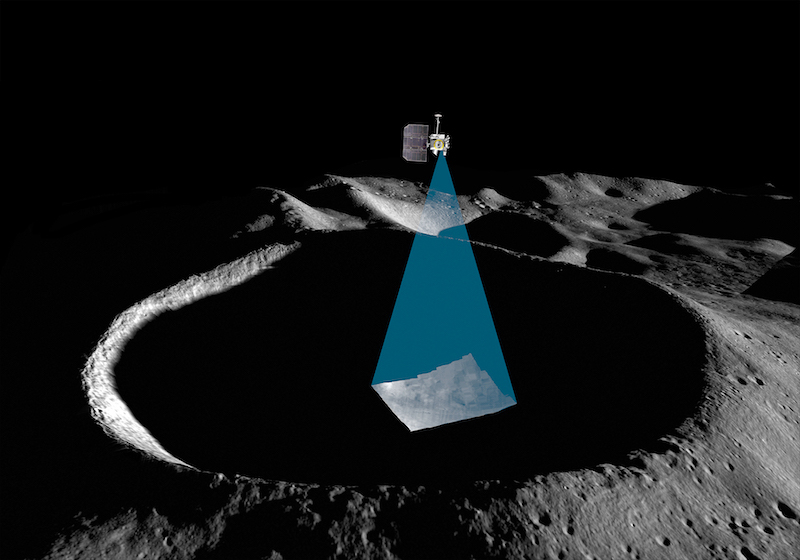
Permanently shadowed crater on the moon
Some regions near the moon’s poles never see sunlight. They are permanently in shadow. It’s been difficult so far to glimpse anything inside them. But they’re known to contain water ice, and so might be valuable for our human exploration of the moon, and beyond. And on January 9, 2023, NASA’s ShadowCam instrument, on South Korea’s Danuri lunar orbiter (aka KPLO), released its first image of one of these permanently shadowed regions on the moon.
ShadowCam’s creators – at Arizona State University and Malin Space Science Systems – wrote at their website:
The [moon’s] poles are in a perpetual state of dawn to dusk, with the sun always on the horizon. As a result, depressions near the poles never receive direct solar illumination, areas known as permanently shadowed regions or PSRs.
They said NASA’s Lunar Reconnaissance Orbiter has imaged nearly all of the moon at meter scale … except within the permanently shadowed regions.
ShadowCam is able to see into the craters because it’s a highly sensitive camera, which takes advantage of light dimly reflected from nearby topography. Its website explained:
For film photography, this would be the equivalent of increasing from ISO 100 to greater than 12,800 without increasing grain.
ShadowCam’s 1st image of a permanently shadowed crater
The new image – inside Shackleton Crater near the lunar south pole – is the first one that Danuri took of a permanently shadowed region. It reveals an area of lunar regolith about 6,500 feet (2,000 meters across). To be sure, it may not seem too spectacular, but it is our first good look in this area that otherwise is shrouded in complete darkness all the time. There are many small craters peppered across the landscape.
And, if you look carefully, you can see a small boulder that has left a trail behind it, starting at the middle top edge of the image, as it rolled down the side of the crater. The inside of the crater is sloping downward toward the bottom of the image.
Indeed, the level of detail visible is pretty impressive, especially considering that normally we can never see any of it.
Many craters in these permanently shadowed regions contain water ice. This is because the temperatures never get high enough for the ice to sublimate. So, as well as being permanently dark, these craters are permanently cold.
Shackleton Crater, however, is a bit warmer. Therefore, no ice deposits are visible or have been detected otherwise within the crater.
But now, it will be easier to look for ice deposits in deeply shadowed craters. As Jason Crusan, Director of NASA’s Advanced Exploration Systems Division at NASA Headquarters, had previously noted:
Permanently shadowed regions have been a mystery because the perpetually dark interiors are difficult to image and existing research offers varying interpretations regarding the distribution of volatiles within these cold regions.
ShadowCam and Danuri
The ShadowCam instrument is onboard the Danuri spacecraft. Danuri entered orbit around the moon on December 16, 2022. ShadowCam is 200 times more light-sensitive than the camera on NASA’s Lunar Reconnaissance Orbiter. That’s the camera that scientists previously used to look at the permanently shadowed regions.

Danuri is South Korea’s first moon mission.
About ShadowCam
ShadowCam is part of the Korea Aerospace Research Institute’s Korea Pathfinder Lunar Orbiter (KPLO) mission (also known as Danuri). It was launched at 7:08 p.m. EDT on a SpaceX Falcon 9 from Launch Complex 40 on the Cape Canaveral Space Force Station in Florida on August 4, 2022. It is one of five instruments onboard Danuri.
ShadowCam maps the reflectance of permanently shadowed regions to search for evidence of ice deposits, observe seasonal changes and measure the terrain inside the craters.
In addition, scientists can use the data from ShadowCam for future human exploration of the moon, such as with Artemis. The imagery can assist in choosing landing sites and exploration planning. This includes identifying ice deposits as a water resource for astronauts. Crusan said:
Future missions in deep space will be safer and more affordable if we have the capability to harvest lunar resources, and ShadowCam has the potential to greatly increase our understanding of the quality and abundance of those resources in these regions.
Moreover, the science data provided by ShadowCam can help scientists better understand the moon’s history and formation.
There are more than 300 known permanently shadowed regions on the moon. ShadowCam will be looking at many if not all of them, so expect more more great images in the near future!
Bottom line: NASA’s ShadowCam instrument on the Danuri moon orbiter has sent back its 1st image. It shows never-before-seen details in one of the moon’s darkest shadows.











